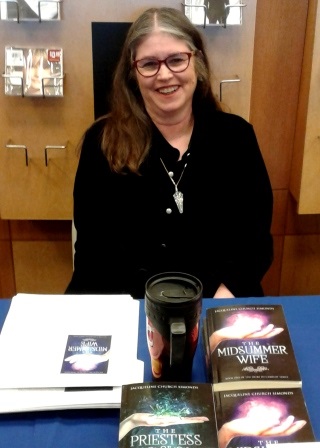Are you a morning person or a night person?
You take your life into your hands if you try to speak to me prior to 10 a.m. I have been that way my whole life. I used to be a night person, and had my best stuff go on after 2 a.m. Now I am lucky if I can manage to be coherent after 10 p.m. So I would have to say, “Stop being so binary. If I am awake, I am personing.”
Do you have a day job as well?
I have 3, actually. I am still a publishing consultant and editor, I am helping create a cloud application software company, and I work at the Barnes & Noble in Reno. Some days I am too damn tired to write.

Do you plan on owning a publishing house?
Been there, done that, sold the movie rights for too cheap. We started Beagle Bay, Inc. to publish my first book about a female pirate captain in the 1700s, Captain Mary, Buccaneer. Then someone approached us to publish a YA book. Then someone else approached us. In the end, we put out 12 titles with Beagle Bay, another 12-14 under our Creative Minds imprint (which was for projects we did for other people, aka – Subsidy), and 3 under our Memory Tree imprint (memoirs & autobiographies). I also have been an editor (developmental, content, and/or line) for about 24 additional books. We had a book distribution company in the ‘00s, back when you had to print at least 1500 books to get your title into distribution. We carried about 43 titles at our top.
Most of our books were reviewed by at least one of the “Big Five” pre-publication reviewers, we won many national awards, and sold foreign rights to about 10 titles. I also taught seminars at “publishing universities,” maintained one of the most frequented self-publishing websites (and then turned that into a book: The New Self-Publisher’s FAQ), and was a “List Mom” for one of the most popular Yahoo groups for self-publishing. I still help writers become “authorpreneurs.”
In that 10-ish year period I didn’t manage to produce any more novels (I’d get about 10 pages in and get distracted), nor read a book that I wasn’t somehow involved in.
Have you ever turned a dream or a nightmare into a written piece?
Two books started out as dreams. Priestess of Camelot began as a more-or-less Mists of Avalon dream (so, Arthurian fantasy). It became the prequel to the Heirs of Camelot series when the frame narrative I constructed (because I thought Priestess needed a more interesting start) was more popular with beta readers, and became its own story, The Midsummer Wife (Book 1) (an Urban Fantasy / Paranormal Romance).
The project I am working on a right now also started as a dream. It’s a Space-Opera/Romance currently called Stars Full of Thunder. Hopefully, it will be a stand-alone book (although I thought that of Priestess, too).
Can you tell us about your current projects?
I have 2 books out in the current series (see above). The third, The Solstice Bride (Urban Fantasy / Dystopian / Paranormal Romance), has hit a production snag (my publisher is Vagabondage Press / Strange Fictions Press), so it won’t come out until June. I have already finished the final book in the series, Mistress of the Rose Moon (Urban Fantasy / Quest / Paranormal Romance). No idea when that will come out.
Stars Full of Thunder is coming along. I’m only about 10,000 words in. When I’m not suffering the usual writer’s angst, I think it’s pretty good. Once I do a first edit, I will start querying for agents.
How long on average does it take you to write a book?
About 2 years. I have this really strange cycle I go through, where I’ll write the draft fairly quickly (about 3-6 months), then I will edit it. Then I will dink with it for months. Then I will rewrite it entirely. Then I will edit… I may rewrite again. By the time the publishing editor gets to it, I will have gone over the manuscript a few hundred times. Then we really edit!
Do you like to create books for adults?
I don’t have kids, and at age 60, I am rather a long walk from being a young person. I find it more interesting to consider the challenges of being an adult (I’m still trying to figure out this whole adulting thing, myself). I also write sex-positive love scenes. Nice, consensual love-making is fun to be a part of and write about.
Have you thought about joining with another author to write a book?
I have talked to a couple of people. I have some ideas for 2 different humor/sci-fi novels. But for some reason, I just kill all the funny in my writing. I came close at one point to having a co-author, but that fell through. I haven’t given up hope, but I am finding it less likely.
Do you read your book reviews? How do you deal with bad or good ones?
I do absolutely read reviews. Especially the bad ones; many times. The first time I read a bad one, I know I will be personally hurt. That’s a given. You put your brain-child out in the world, and it hurts like hell to be told it is insufficient in some manner. Once I get over the “writer-fee-fees,” I go back and read it dispassionately. What is the reviewer saying? What did I fail to do to reach them? Are they biased in some way? What expectations did I not meet—and is that a good or a bad thing?
Writing is a learning process. If you think you’re the next undiscovered Hemingway, you need to get out more. Hemingway suffered from the most horrific reviews—and that was before the age of the Internet! So we need to study how we are letting down our reader/buyers. Because, in the end, this is a consumer-driven industry. If you aren’t making connections with your readers, that’s on you. Learn to do better (hint: “meeting expectations” does NOT mean writing the way everyone else does).
What is your favorite quote?
My favorite is often misquoted to disparage we dreamers and mental creators. But hear what Henry David Thoreau said in context: “If you have built castles in the air, your work need not be lost; that is where they should be. Now put the foundations under them.”
Dream your dreams, have your wild-ass ideas. That’s as it should be. But if you want to make them come true, you have to work to make them reality.
Learn more at JCSimonds.com


